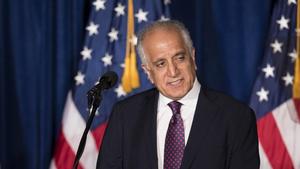 In this April 27, 2019 file photo, former US Ambassador to Afghanistan Zalmay Khalilzad speaks at the Mayflower Hotel in Washington, DC. (BRENDAN SMIALOWSKI / AFP)
In this April 27, 2019 file photo, former US Ambassador to Afghanistan Zalmay Khalilzad speaks at the Mayflower Hotel in Washington, DC. (BRENDAN SMIALOWSKI / AFP)
WASHINGTON - A senior US envoy left for Doha and Kabul on Sunday to press Taliban and Afghan government officials to open peace talks that the United States hopes will allow it to withdraw from Afghanistan, the US State Department said.
The three main impediments to the start of intra-Afghan negotiations have been a rise in violence, the pace of prisoner releases and the failure of Ghani and Abdullah to resolve a power struggle
The US special representative for Afghanistan, Zalmay Khalilzad, left one day after Afghan President Ashraf Ghani and his rival Abdullah Abdullah signed a power-sharing deal that could help lead to peace talks to end the country’s long-running war.
The three main impediments to the start of intra-Afghan negotiations, which were to begin March 10, have been a rise in violence, the pace of prisoner releases and the failure of Ghani and Abdullah to resolve a power struggle.
READ MORE: Afghan President Ghani, rival Abdullah sign power-sharing deal
While in Doha, Khalilzad will meet with Taliban officials to discuss carrying out a Feb 29 US-Taliban agreement that called for prisoner releases by both sides and to “press for steps necessary to commence intra-Afghan negotiations, including a significant reduction of violence,” the State Department said.
In Kabul, Khalilzad will meet with senior government officials “to explore steps the Afghan government needs to take to make intra-Afghan negotiations begin as soon as possible,” it added.
ALSO READ: Afghans say Taliban behind bloodshed, reject US blame of IS
The key provisions of the Feb 29 agreement - to which the Afghan government was not a party - involved a US commitment to reduce its presence in Afghanistan to 8,600 troops by mid-July and, conditions permitting, to zero by May 2021.


